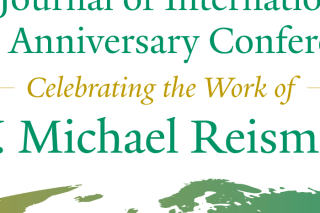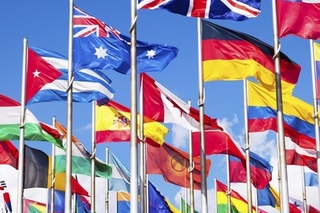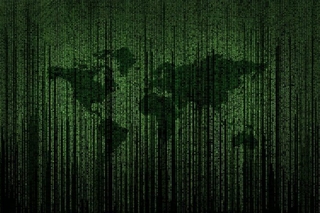Explore YJIL
-
About Us
Learn more about YJIL.
-
YJIL Online
Explore YJIL Online.
-
Submissions
Learn more about submitting to YJIL.
-
Print Issues
Explore our print archives.
Recent Publications:
-
Addressing Femicide Through International Criminal Law: The Need for a Binding Legal Framework
Alessia Nicastro: Considering the devastating impact of femicide on women’s rights, it is imperative for international law to explicitly recognize it.
-
The Yale School of International Law
In this Essay, Harold Hongju Koh discusses the Yale School of International Law and its focus in the next phase of the twenty-first century.
-
The Reciprocity Dialectic in Transnational Corruption: The Relative Responsibility of Private and Public Actors Under International Law
The Essay explores the bilateral character of transnational corruption and the need to hold both public and private actors responsible.
-
On the Legality of Prosecuting State-Owned Enterprises: Halkbank v. United States
In this Features Essay, the authors discuss the legality of prosecuting foreign state-owned enterprises under international law.
-
Comity and the Criminal Law: Reflections on Prosecutorial Legitimacy in Reisman’s World Public Order
The Essay evaluates the question of whether states should use criminal law enforcement as a tool of international affairs.
-
Two Approaches to Economic Coercion
Jacob Katz Cogan explores regulatory and abolitionist approaches to economic coercion.
-
Reisman’s Rules: Placing Intelligence and Collective Security in Context Two Years After Russia’s Full-Scale Invasion of Ukraine
The Essay examines how Reisman’s scholarship helps us understand the lessons from Russia’s invasion of Ukraine.
-
“Humanizing” Economic Sanctions? Lessons from International Humanitarian Law
This Features Essay is part of a series of contributions on Third World Approaches to International Law (TWAIL) & Economic Sanctions.
-
Weapons Against the Weak: International Law and the Political Economy of Coercion
This Features Essay is part of a series of contributions on Third World Approaches to International Law (TWAIL) & Economic Sanctions.
-
Sanctions, Dollar Hegemony, and the Unraveling of Third World Sovereignty
This Features Essay is part of a series of contributions on Third World Approaches to International Law (TWAIL) & Economic Sanctions.
Recent Publications:
-
-
- Symposia
Sanctions and “Bio-Necro Collaboration”
This Features Essay is part of a series of contributions on Third World Approaches to International Law (TWAIL) & Economic Sanctions.
-
- Symposia
Third World Approaches to International Law & Economic Sanctions
This series of Features Essays is an extension of YJIL’s 2023 symposium, Third World Approaches to International Law (TWAIL) & Economic Sanctions.
-
- Symposia
The Right to Development
The article examines how the New Haven School of Jurisprudence and Chinese traditional culture aid in realizing the right to development.
-
- Symposia
The Quest for the Future of the WTO: From the Perspective of World Order
Shi examines the future of the World Trade Organization.
-
- Symposia
The Prescient W. Michael Reisman
Burr examines Reisman’s insights on microlegal norms in daily interactions and their link to broader public order issues and macrolegal consequences.
-
- Symposia
The Changing Landscape of International Law Scholarship: Do Funding Bodies Influence What We Research?
Peat and Rose analyze 20 years of data showing how external funding shifts international law research toward interdisciplinary and empirical methods.
-
- Symposia
International Law Scholarship: An Empirical Study
Professors Oona Hathaway and John Bowers conduct an empirical analysis of the present state of international legal scholarship and its changes.
-
- Symposia
Comparative International Law and the Rise of Regional Journals
Verdier investigates the role of regional international law journals in comparative international law from qualitative and quantitative standards.
-
-
- Features Essays
A Targeted Killing in Canada?
Canada and India’s dispute over the killing of Hardeep Singh Nijjar raises complex international legal issues involving sovereignty and human rights.
-
- Features Essays
Unilateral Sanctions Under International Human Rights Law: Correcting the Record
Fellmeth argues that UN Special Rapporteur Douhan’s report on sanctions is flawed in evidence, interpretation, and application of international law.
-
- Features Essays
Implementing Integrated Deterrence in the Cyber Domain: The Role of Lawyers
Caroline Krass discusses the lawyers’ role in integrated deterrence at the U.S. Cyber Command Legal Conference, noting cybersecurity and compliance.
-
- Symposia
Weapons Against the Weak
Sanctions enable Global North to coerce Global South. With rising multipolarity, this trend may shift, altering global economic dynamics.
-
- Symposia
Discussant Comments
Achiume highlights global racial justice implications of sanctions, using TWAIL and LPE perspectives, urging a reset in sanctions debates.
-
- Symposia
The Antinomies of “Peaceful” Economic Sanctions
The antinomies of “peaceful sanctions” as symptomatic of the material basis of the international legal order.
-
- Symposia
The Brutal Impact of Sanctions on the Global South
Sanctions and their damage to the Global South by actively undermining economic development systems and resources.
-
- Symposia
The Fog of Peace: Who Profits from Economic Sanctions?
Sustaining the myth of the dichotomy between the domains of war and peace exacerbates the vulnerability of certain states.
-
- Symposia
Successful Failures: Economic Sanctions, Humanitarianism, and the Undoing of Post-Colonial Sovereignty
The successful failure of the humanitarian critique of economic sanctions as it relates to humanitarian relief provided to Afghans.
-
- Symposia
Economic Sanctions and Humanitarian Principles: Lessons from International Humanitarian Law
Sanctions often serve as a means of waging economic warfare in an era of intensified geopolitical tension.





















